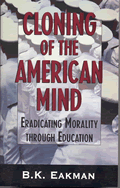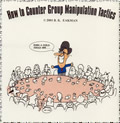Other
Eakman
Articles:
So, You Want to be an "Education" Candidate
The Resignation of a Schoolteacher
GOVN'T. EMPLOYEES TO DECIDE IF THE PUBLIC'S MIND IS HEALTHY
By
Beverly Eakman
May 29, 2007
NewsWithViews.com
With the deadliest school shooting spree in U.S. history at Virginia Tech in Blacksburg has come predictable calls for mental health screening and mandatory intervention�a debate that has actually been going on for some 20 years.
As early as 1985, well before the current level of school violence, some educators were piloting psychological assessments, interspersing personal, opinion-oriented questions among legitimate academic fare. Pennsylvania�s Educational Quality Assessment, for example, asked children as young as eight to answer a large number of what-would-you-do-if questions and to complete word-association-type exercises that smacked of sophisticated, clinical personality inventories. The Interpretive Literature explaining the tests (when one could get hold of it) detailed what was being assessed: the child�s �locus of control,� whether a child was �externally or internally motivated,� a student�s �amenability to change,� plus a willingness to �conform to group goals� and �receive stimuli.� Another quasi-academic test, the Testing Essential Learning and Literary Skills exam, indicated in the Foreword to fellow professionals that the purpose was to sniff out �indicators of gullibility,� with a caveat further on that the test �also appears to measure knowledge to some extent.�
States like Nebraska and Michigan were not far behind, and by the 1990s, nearly all schools were incorporating psychological surveys, especially into their �health� programs.
Eventually, the term �loner� became synonymous with �quirky,� then linked to �sociopathy.� The person who thought for him (or her) self instead of basing actions on the peer group was considered out-of-step. This represented a 180-degree turnabout from the World War I and II generation, an era when nearly every family owned a gun and youngsters were taught to stand up to bullies on the playground instead of negotiating a peace.
Today, everyone from talk show hosts to President George W. Bush and the National Education Association is banking on psychiatric diagnoses to identify, label and treat eccentric behavior before it turns deadly�which is kind of strange in light of sadistic video games, pornographic magazines and how-to bomb-making literature, all easily available to any pedophile, terrorist or nut-case. And then there�s the self-esteem issue, which, if too low, supposedly turns kids into criminals, while other authorities insist it is high self-esteem that results in children becoming delinquents. Mental health gurus can�t seem to agree whether most psychopaths and sociopaths have low, or high, opinions of themselves, in any case.
And therein lies the problem with mental health screening, psychotropic drugging, counseling and therapy, involuntary commitment�and behavioral science in general. Put 100 psychiatrists in a room and 50 will say screening instruments and mandatory psychotropic drugging are the answer to public safety and the other 50 will claim that the potential for harm outweighs any benefit (think Columbine killers on Luvox, and Andrea Yates drowning her five children after imbibing a prescribed cocktail of antipsychotics and antidepressants). Most psychologists already agree that young Americans are excessively self-focused�not a particularly encouraging side-effect of today�s non-stop emotional temperature-taking.
[Advertisement: Beverly's book, "Cloning of the American Mind" is out of print. Supply is limited, order your copy while supply lasts.]
Much as we�d like a magic bullet�better make that �magic diagnosis� or �magic pill��the behavioral sciences simply don�t have the track record to support prediction or prevention strategies. We�re not there yet. We know only enough to get into trouble. Psychological profiling has a way of coming back to bite us (think airport security). Psychological screening: We wind up tracking and monitoring innocents. Involuntary commitment schemes turn nations into political gulags.
Given our computerized, high-tech society, should we expect better today? Don�t we have quite enough political correctness already, no matter which side tries to use it? Do we really want to homogenize thought�because that�s really what it comes down to once �experts� start deciding which thoughts are acceptable and which ones are not.
Americans need to stop fixating on so-far unproven theories about chemical imbalances in the brain and trendy mental health labels (attention-deficit disorder, obsessive-compulsive disorder, hyperactivity, oppositional-defiant disorder, etc.) and decide instead just how much it is willing to put up with in the way of out-of-control behavior. The bottom line is that too many kids are running amok�at ever younger ages�and too many violent offenders, who have already demonstrated their intentions, are being returned to the streets.
|
Subscribe to the NewsWithViews Daily News Alerts! |
It is average Americans, not �experts,� who must draw a line as to what they will tolerate. Until that happens, all the psychologists, medications, counseling services, and screening instruments in the world will not be enough to prevent the �mad� rampages that increasingly define our era.
Article
of Interest:
1, 425 pound
Judge treats people like dirt in her courtroom
� 2007 Beverly Eakman - All Rights Reserved
[Beverly's
book; Cloning
of the American Mind is out of print. Supply is limited, so order
your copy while supply lasts.]
Beverly K. Eakman is a former teacher and retired U.S. Justice Department employee with the Civil Rights Office. She is a Washington, DC-based freelance writer and the author of three books
Author: 3 books on education and data-trafficking since 1991, including the internationally acclaimed Cloning of the American Mind: Eradicating Morality Through Education. Executive Director, National Education Consortium.
Website: BeverlyE.com
E-Mail: deakman@erols.com
It is average Americans, not �experts,� who must draw a line as to what they will tolerate. Until that happens, all the psychologists, medications, counseling services, and screening instruments in the world will not be enough to prevent the �mad� rampages that increasingly define our era.













